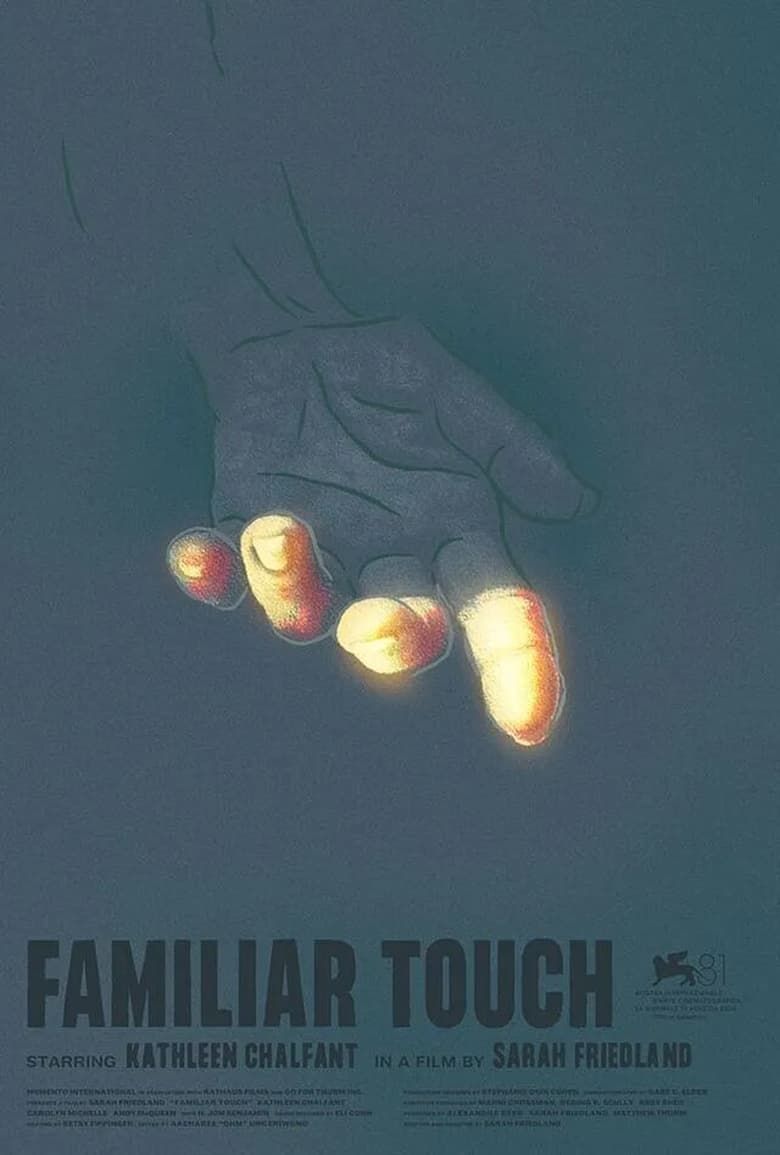With a unique approach to its portrayal of dementia, Sarah Friedland’s Familiar Touch is a movie that I really wanted to like. Touting itself as a coming-of-old-age story about a woman entering a long-term care facility, the idea of honoring this transition as a beginning rather than an end seemed like a respectful and intriguing way to approach this narrative. The final product, however, is a lethargic and occasionally frustrating drama, in which the spirited protagonist is dismissed and discarded as her reality begins to betray her. While Friedland’s feature directorial debut features some beautiful cinematography and tackles an important topic, it falls short as an anti-ageist piece of cinema by giving Ruth (Kathleen Chalfant) no agency and little respect in what’s presented as an empowering story.
‘Familiar Touch’ Offers a One-Dimensional Exploration of Dementia
The perspectives of those with late-stage dementia are largely inaccessible, and consequently, movies about memory loss often dedicate a good amount of their runtime to showing the effect that it has on caregivers and loved ones. Familiar Touch forgoes exploring its other characters too deeply, and makes sure to center Ruth in this narrative. Kathleen Chalfant brings a quiet strength to the iron-willed woman, and we get a well-rounded image of Ruth as a person. Even as her identity changes with her condition, we learn about her past as a cook and her complicated feelings surrounding motherhood. However, while the story revolves around Ruth and her experiences, it seems to shy away from actually unpacking the complexities of her dementia.
All the residents of “Memory Lane,” as they call it, are shown to experience dementia in pretty much the same way. They’re well-spoken and seemingly coherent until their actions betray their conditions, such as when Ruth puts toast in her dish rack, and another woman uses a chip clip as a barrette. The residents are never angry or combative, and even Ruth’s frustrations are muted and over with quickly. Though it may be difficult — and possibly problematic — to portray more advanced stages of cognitive decline, the movie only offers one representation of memory loss. Familiar Touch feels slightly sanitized from what people experience when living with dementia, and it feels like a wasted opportunity to honor these struggles.
Sight and Sound Make for an Isolating and Tangible Experience in ‘Familiar Touch’
Writer and director Sarah Friedland’s passion for choreography is evident in the film. As the story progresses, Ruth connects with herself mainly through movement and breath. The camera hones in on these moments, giving the movie a grounded, tangible feel. However, the many shots of Ruth’s body, while powerful, often feel disconnected from a story that is so prominently about the mind. Where a movie like The Father uses visuals to help us understand Anthony Hopkins‘ confusion, Familiar Touch is more interested in how Ruth’s sense of self becomes connected to her physicality. In this sense, Familiar Touch doesn’t quite do enough to convey Ruth’s sense of disorientation.

Related
‘The Notebook’ Remains One of the Most Heartbreaking Movies on Dementia
‘The Notebook’ stands out not just for its sweeping romance, but also its portrayal of dementia.
On the other hand, sound design (or the lack thereof) contributes greatly to Ruth’s uneasy sense of isolation. While at the beginning of the movie the silence surrounding Ruth in her home feels peaceful, the same stillness of the care facility feels almost claustrophobic. Although this choice to forgo music for most of the movie is impactful, unfortunately, it does feel monotonous as the film goes on. Furthermore, many people living with dementia find great joy and comfort in music, so avoiding it almost completely is a bold but bizarre choice.
Care Workers Are Portrayed Irresponsibly in ‘Familiar Touch’
Ruth’s main companion throughout Familiar Touch is Vanessa (Carolyn Michelle Smith), a care worker at the Bella Vista facility. The two form a bond, but Vanessa is still often impatient with Ruth, seeming to see her more as an annoyance than a friend or patient. Likewise, Vanessa’s supervisor, Brian (Andy McQueen), talks down to Ruth when she’s obviously confused, eager to cozy up to his subordinate instead. Ruth’s primary care workers are occasionally disrespectful, but they’re never explicitly awful until the movie’s third act. In one truly infuriating scene, Ruth winds up in a dangerous situation and is then reprimanded for it, when those responsible for looking after her are clearly to blame. The caregivers’ reckless and insensitive behavior in this scene feels like a disservice to those who devote themselves wholly to this line of work, and the scene is disturbingly out of place in a movie purporting to champion care workers and patients alike. Many caregivers and residents form strong relationships, and the film neglects to show this when Vanessa treats Ruth so thoughtlessly.
After this moment, it’s hard to root for, or really respect, any character except Ruth. As we watch her rediscover herself throughout Familiar Touch, the people in Ruth’s life largely cast her aside. Family and caregivers seem to see Ruth as a reminder of their past — a relic for them to project their feelings onto, rather than a complete person. They neglect to visit her and forage through her possessions like vultures, eager to memorialize a woman who is still very much alive. Ruth’s son, Steve (H. Jon Benjamin), even stops calling her mom, erasing a piece of Ruth’s identity because he doesn’t know how to handle their evolving relationship. If Familiar Touch‘s goal was to treat Ruth with dignity and paint an admiring picture of long-term care facilities and the workers who populate them, then this movie is a well-intentioned swing and a miss. The coming-of-old-age story has stunning potential, but it ultimately leaves its strong-willed lead vulnerable and alone while her world moves on without her.

Sarah Friedland’s directorial debut is a visually striking but shallow exploration of dementia.
- Release Date
-
September 3, 2024
- Runtime
-
90 minutes
- Director
-
Sarah Friedland
- Producers
-
Regina K. Scully, Alexandra Byer, Matthew Thurm
-

-

Carolyn Michelle Smith
Vanessa
- Focuses on Ruth’s experiences rather than those of her family and caregivers.
- The intimate shooting style gives the movie a grounded feel.
- Caregivers are portrayed as insensitive and unprofessional.
- The movie only depicts dementia through one very specific lens.
- The movie’s use of silence, while powerful, gets boring.



